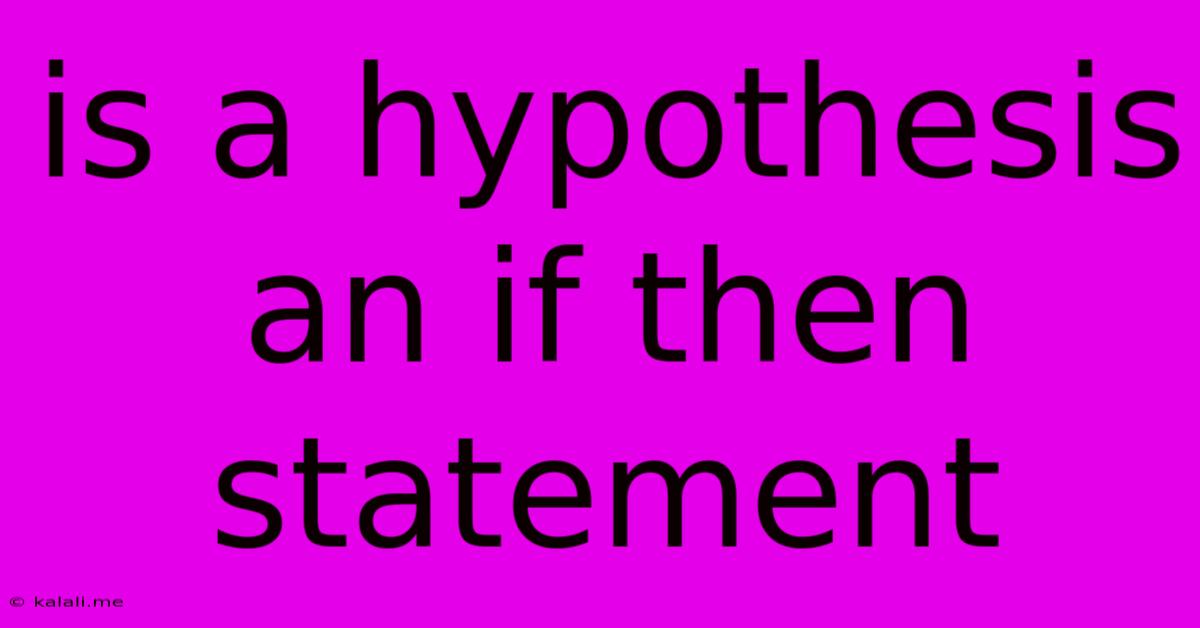Is A Hypothesis An If Then Statement
Kalali
May 10, 2025 · 3 min read

Table of Contents
Is a Hypothesis an If-Then Statement? A Deep Dive into Hypothesis Formulation
Meta Description: Many believe a hypothesis must always be an "if-then" statement, but is that truly accurate? This article explores the nuances of hypothesis construction, clarifying when an if-then format is appropriate and when other structures are equally valid. We’ll delve into examples and best practices for crafting effective hypotheses for research.
A common misconception surrounding scientific research is that a hypothesis must be formatted as an "if-then" statement. While this format is frequently used and undeniably helpful in certain contexts, it's not a universal requirement. The truth is more nuanced: the effectiveness of a hypothesis hinges on its clarity, testability, and alignment with the research question, not solely its grammatical structure.
What is a Hypothesis?
Before diving into the "if-then" debate, let's establish a solid understanding of what a hypothesis actually is. A hypothesis is a testable statement that proposes a possible relationship between two or more variables. It's a tentative explanation that serves as a starting point for scientific investigation. It's crucial to remember that a hypothesis is not a mere guess; it's an educated prediction based on existing knowledge and observation.
When "If-Then" Statements Work Well
The "if-then" structure (also known as a conditional statement) is particularly useful when exploring cause-and-effect relationships. This format clearly outlines the independent and dependent variables.
- Independent Variable: The factor being manipulated or changed (the "if" part).
- Dependent Variable: The factor being measured or observed (the "then" part).
Example:
- If plants are exposed to more sunlight, then they will grow taller.
In this example, sunlight exposure is the independent variable, and plant height is the dependent variable. This structure makes it easy to design an experiment to test the hypothesis.
Beyond "If-Then": Other Hypothesis Structures
While the "if-then" format is prevalent, particularly in experimental research, it's not always the most appropriate or effective structure. Many hypotheses, especially those in observational studies or correlational research, don't neatly fit this mold.
Here are some alternative structures:
- Comparative Hypotheses: These compare two or more groups or conditions. For example: "Students who receive tutoring will score higher on standardized tests than students who do not receive tutoring."
- Descriptive Hypotheses: These predict the characteristics or properties of a phenomenon. For example: "The average lifespan of a chimpanzee in captivity is longer than that of a chimpanzee in the wild."
- Relational Hypotheses: These suggest a relationship between two or more variables without implying causality. For example: "There is a positive correlation between hours of exercise and stress reduction levels."
Key Characteristics of a Strong Hypothesis, Regardless of Structure
Regardless of whether it's an "if-then" statement or another format, a strong hypothesis should always:
- Be testable: It must be possible to collect data to support or refute the hypothesis.
- Be falsifiable: There must be a possible outcome that would disprove the hypothesis.
- Be specific: It should clearly define the variables and the expected relationship between them.
- Be based on prior knowledge: It should be grounded in existing research and observations.
Conclusion: Focus on Testability, Not Structure
In conclusion, while an "if-then" statement is a common and useful format for framing hypotheses, particularly in experimental research, it's not mandatory. The critical aspects of a good hypothesis are its clarity, testability, falsifiability, and alignment with the research question. Choose the structure that best suits your research design and ensures that your hypothesis is clear, concise, and effectively guides your investigation. Focus on creating a testable prediction, not forcing it into a specific grammatical mold.
Latest Posts
Latest Posts
-
How Many Months Is A Hundred Days
Jul 18, 2025
-
Mother And I Or Mother And Me
Jul 18, 2025
-
How Many Oz In One Water Bottle
Jul 18, 2025
-
How Many Dimes In A 5 Roll
Jul 18, 2025
-
How Do You Say Basil In Spanish
Jul 18, 2025
Related Post
Thank you for visiting our website which covers about Is A Hypothesis An If Then Statement . We hope the information provided has been useful to you. Feel free to contact us if you have any questions or need further assistance. See you next time and don't miss to bookmark.